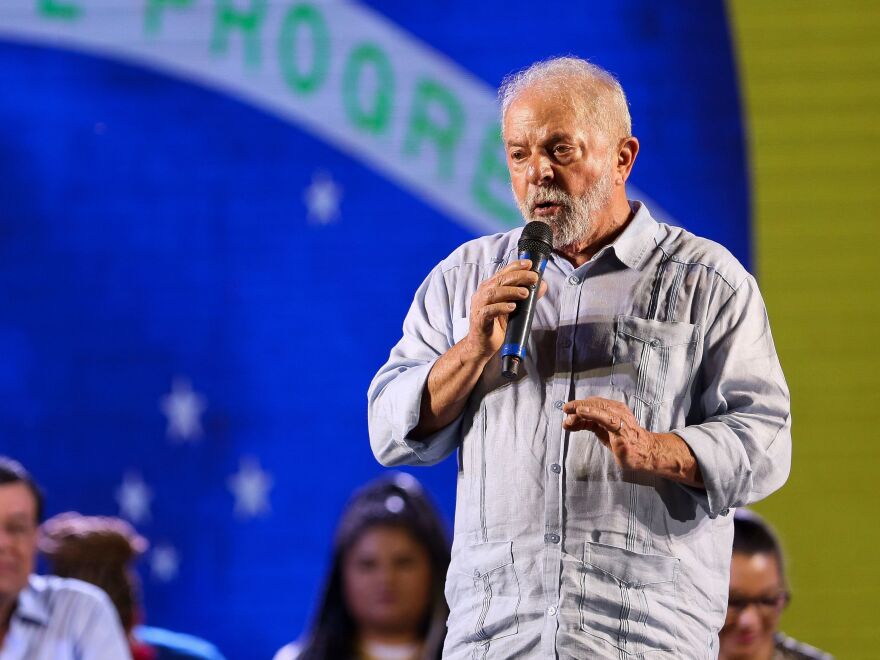Updated October 3, 2022 at 12:00 PM ET
SÃO PAULO, Brazil — A day after an inconclusive presidential election, Brazil is now bracing for a frantic four-week campaign ahead of a runoff vote that will pit leftist Luiz Inácio Lula da Silva against Jair Bolsonaro, the far-right incumbent president.
Official returns from Sunday's first round showed da Silva, a former two-term president universally known as Lula, with 48.4% compared to 43.2% for Bolsonaro. The remaining votes went to nine other candidates.
Da Silva needed to get more than half of the votes to avoid a head-to-head matchup against Bolsonaro, who proved far stronger than public opinion polls had predicted. The two are now slated to meet in an Oct. 30 runoff.
"It seems that fate wants me to work a little harder," da Silva told thousands of supporters at a post-election rally in downtown São Paulo Sunday night. But he added that victory is "just a matter of time. ... We will win because Brazil needs us."
Many analysts expect da Silva to pick up more votes from the other first-round candidates, giving him the advantage in the runoff.
The third and fourth-place contenders, Simone Tebet and Ciro Gomes, who garnered about 4% and 3% respectively, have not yet endorsed either of the two candidates headed to the second round.
However, Mário Sérgio Lima, a Brazil analyst for the global research company Medley Advisors, said Bolsonaro did better than expected and is still "very much alive."

Some da Silva supporters were disappointed that the former president failed to close the deal Sunday and noted that pro-Bolsonaro candidates also did surprisingly well in legislative and gubernatorial races.
"We came here expecting to have a party, to get very happy, to have some beers," said Pedro Vilela, a data privacy consultant, who attended da Silva's rally. "But now we are going home to just sleep and wait for the next four weeks to see how they go."
Bolsonaro believes he "beat the lie"
Bolsonaro has spent months casting doubts on Brazil's electoral system and hinting that he might not accept the results if he failed to win another four-year term. On Sunday he had harsh words for Brazil's Supreme Electoral Court which oversees the voting.
Without offering any evidence he said of the election authorities, "They took sides. They have a candidate for president. Or at least there's one they don't want, which is me."

Speaking to journalists in Rio de Janeiro, he also gleefully pointed out that he outperformed the polls, many of which predicted he would get only around 35%.
"We beat the lie today," he said.
Claudio Couto, a political analyst at the Getulio Vargas Foundation in São Paulo, said Brazil's census is out of date, which makes it harder for pollsters to accurately predict voting patterns. In addition, he said many Bolsonaro supporters distrust the media and refuse to participate in public opinion surveys.
Yet in his comments to media Sunday night, Bolsonaro also acknowledged voters favoring the competition.
"I understand that a lot of people desire change, but some changes can be for the worst," he said. "We tried to show this other side in the campaign, but it seems like it didn't register with the most important layers of society."
Da Silva made a comeback after imprisonment
Voting was largely peaceful after a contentious, sometimes violent campaign in which Brazil's democracy seemed to hang in the balance amid Bolsonaro's hints that he might try to hang onto power.
Although he failed to secure the presidency, the results were a kind of vindication for da Silva, who became a hero to many Brazilians during his two terms as president between 2003 and 2010, when his expansion of social welfare programs and a commodities-fueled economic boom helped millions of Brazilians rise out of poverty.
After leaving office, da Silva became ensnared in a wide-ranging corruption scandal that landed him in prison for a year and a half. Then, in a stunning turnaround, he was released on a technicality in 2019, his conviction was annulled, and he launched his campaign for the presidency — the sixth time he has run for the office.
Although Bolsonaro, 67, did better than expected Sunday, his second-place finish was a far cry from his easy victory in the 2018 presidential election. Back then he was swept to power by a coalition that included evangelicals, gun owners and other conservatives who were drawn to his pledge to uphold traditional family values and who were disgusted by the corruption scandals swirling around da Silva and his Workers' Party.
Since then, Bolsonaro's erratic behavior and policy decisions have cost him support.
He downplayed the COVID-19 pandemic and Brazil ended up with the world's second-highest confirmed coronavirus death toll after the U.S. He's dealing with a stagnant economy, high inflation and unemployment and rising poverty. And his statements denouncing Brazil's democratic institutions have also turned off many voters.
All this has provided an opening for da Silva, who is now 76 and a survivor of throat cancer. On the campaign trail, he promises a return to the economic good times of his first two terms and portrays himself as the man who could salvage Brazil's democracy — by beating Bolsonaro.
Copyright 2022 NPR. To see more, visit https://www.npr.org.

